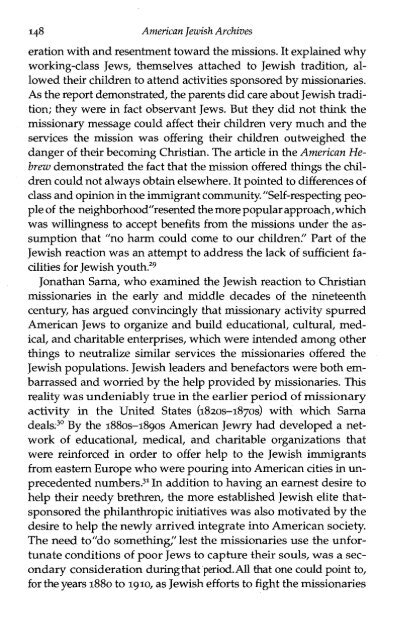Create successful ePaper yourself
Turn your PDF publications into a flip-book with our unique Google optimized e-Paper software.
148 <strong>American</strong> <strong>Jewish</strong> <strong>Archives</strong><br />
eration with and resentment toward the missions. It explained why<br />
working-class Jews, themselves attached to <strong>Jewish</strong> tradition, al-<br />
lowed their children to attend activities sponsored by missionaries.<br />
As the report demonstrated, the parents did care about <strong>Jewish</strong> tradi-<br />
tion; they were in fact observant Jews. But they did not think the<br />
missionary message could affect their children very much and the<br />
services the mission was offering their children outweighed the<br />
danger of their becoming Christian. The article in the <strong>American</strong> He-<br />
brew demonstrated the fact that the mission offered things the chil-<br />
dren could not always obtain elsewhere. It pointed to differences of<br />
class and opinion in the immigrant community. "Self-respecting peo-<br />
ple of the neighborhoodresented the more popular approach, which<br />
was willingness to accept benefits from the missions under the as-<br />
sumption that "no harm could come to our children." Part of the<br />
<strong>Jewish</strong> reaction was an attempt to address the lack of sufficient fa-<br />
cilities for <strong>Jewish</strong> y~uth."~<br />
Jonathan Sarna, who examined the <strong>Jewish</strong> reaction to Christian<br />
missionaries in the early and middle decades of the nineteenth<br />
century, has argued convincingly that missionary activity spurred<br />
<strong>American</strong> Jews to organize and build educational, cultural, med-<br />
ical, and charitable enterprises, which were intended among other<br />
things to neutralize similar services the missionaries offered the<br />
<strong>Jewish</strong> populations. <strong>Jewish</strong> leaders and benefactors were both em-<br />
barrassed and worried by the help provided by missionaries. This<br />
reality was undeniably true in the earlier period of missionary<br />
activity in the United States (1820s-1870s) with which Sarna<br />
deals?' By the 1880s-1890s <strong>American</strong> Jewry had developed a net-<br />
work of educational, medical, and charitable organizations that<br />
were reinforced in order to offer help to the <strong>Jewish</strong> immigrants<br />
from eastern Europe who were pouring into <strong>American</strong> cities in un-<br />
precedented numbers?' In addition to having an earnest desire to<br />
help their needy brethren, the more established <strong>Jewish</strong> elite that-<br />
sponsored the philanthropic initiatives was also motivated by the<br />
desire to help the newly arrived integrate into <strong>American</strong> society.<br />
The need tol'do something:' lest the missionaries use the unfor-<br />
tunate conditions of poor Jews to capture their souls, was a sec-<br />
ondary consideration duringthat period.Al1 that one could point to,<br />
for the years 1880 to 1910, as <strong>Jewish</strong> efforts to fight the missionaries

















